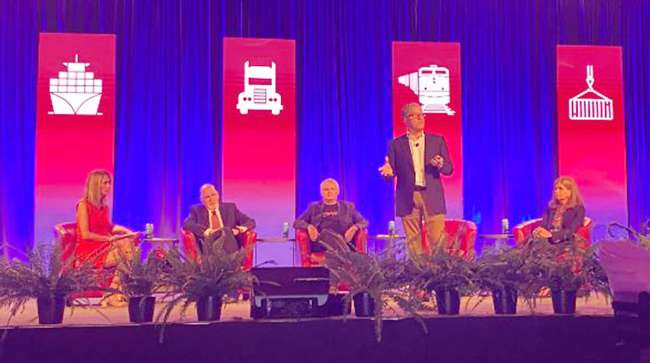Staff Reporter
IANA Panel Tackles Downstream Effects of Intermodal Disruptions

[Stay on top of transportation news: Get TTNews in your inbox.]
LONG BEACH, Calif. — The intermodal market has been climbing out of the freight recession, but very slowly amid continuing disruptions across the globe, according to a panel of experts Sept. 10.
The Intermodal Association of North America hosted the panel discussion as part of Intermodal Expo 2024. The discussion focused on what has been impacting intermodal and what downstream effects that has been having on transloading and trucking.
“We are stuck in neutral in terms of market share for domestic intermodal, and we have been for the last six quarters,” said Larry Gross, president of Gross Transportation Consulting. “We slowly lost quite a bit of share over the course of the [precision scheduled railroading] implementation and then the pandemic. And we have not yet been able to get it all back.”
Gross added that the discussion should focus on returning to growth while taking market share back from on-highway trucking. He did note that market share has seen more of an uptick on the international side though, despite major disruptions across the global supply chain such as Houthi terrorist attacks on ships that traverse the Red Sea.
“It has a profound impact on container demand,” Vespucci Maritime CEO Lars Jensen said. “If you look at the latest numbers from July, if we do the usual stuff, a measure just of TEU, the market is up 5.5%, which is a decent growth. But if we take into account going around Africa and measure the TEU miles, we’re up 27% year-on-year.”
Jensen noted that this situation has contributed to the capacity shortage, but he pointed out it also has led to a spike in freight rates over the summer. While it was still down relative to where rates peaked during the coronavirus pandemic, it was high compared with the historical trend.
“Part of this is because we had an early peak season,” Jensen said. “Everybody seemed to be scared about the disruptions around Africa, scared about the potential of a strike on the East Coast. There was some element of goods being moved in anticipation of additional tariffs. There are additional tariffs coming. So that all caused the peak to happen earlier than usual.”
Jensen added that the peak shipping season happened about three weeks earlier than usual. He also has observed the formation of new ocean shipping networks now that companies have adjusted to the Red Sea hostilities.
However, a potential port strike and the disruptions that would bring remain a factor.
“If there is not an agreement between the USMX [U.S. Maritime Alliance], so the terminals and the ports, and the ILA [International Longshoremen’s Association] on the union side, it seems we are heading for a strike,” Jensen said. “A strike is going to have a massive impact, not only on the supply chain, but the U.S. economy as a whole. We haven’t had a major strike on the East Coast since 1977.”
Nelson calculated that every day of a strike is likely going to add six days to the resulting backlog.
Ken Vieth, president and senior analyst at ACT Research, shifted the discussion to on-highway freight transportation.
TT's Seth Clevenger and Mike Senatore dive into the details behind the 2024 Top 100 Private Carriers list. Tune in above or by going to RoadSigns.ttnews.com.
“So typically, during the late cycle, freight demand slows and equipment supply goes to excess. What happens then is you get to the cycle bottom, where people, or I should say truckers, stop buying trucks. That has not happened. This is the in-a-nutshell issue that we’re seeing on-highway today.”
Vieth has continued to see capacity come online despite these market conditions but noted some potential good news is that transportation appears to be in early cycle of freight growth.
InTek Freight & Logistics President Shelli Austin offered a third-party logistics perspective.
“It seems like that we’ve been playing in the defense for about two years with this freight recession. And it’s been really tough. We’ve kept our head down and worked on the different things. Interest rates are at their highest since 2001. And what we’re hoping, we’re starting to see, just a bit of a turn.”
Want more news? Listen to today's daily briefing above or go here for more info
Austin added that conditions have started to improve but not as much as many had hoped. She is optimistic that activity such as home building and renovations will pick up if interest rates are lowered.
Austin also observed that transloading is growing amid the current market conditions.
“Being a 3PL, we can offer those solutions to be able to do transloading,” Austin said. “You wouldn’t traditionally think of a transloading solution for Mexico. But you talk about the West Coast, you talk about the East Coast, and everybody’s done transloading there forever. Now we’re bringing all this product in from Mexico, so Dallas is a really good place to have transloading.”





